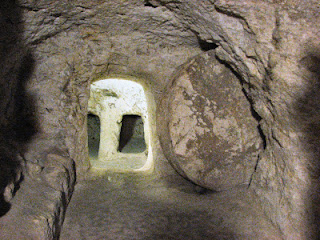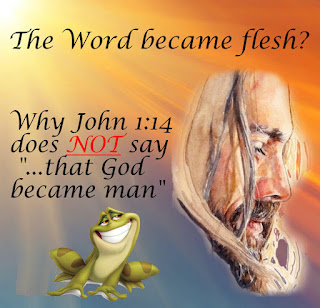"Let us make man..." Is Genesis 1:26 Evidence that God is a Trinity?
To hear the One God Report Podcast on this question, click here.
1.
It is popular for modern
Trinitarians to claim that Genesis 1:26 is evidence that there are three
persons in the Godhead, and that one of the persons, presumably the Father, is
speaking to one or more other persons in the Godhead. I’ve heard well respected
pastors say this, not to mention quite a few lay persons. Most articles on the
internet still say this.
2.
Genesis 1:26-27: "Then
God said, 'Let us make man in our image, after our likeness; and let them have
dominion over the fish of the sea, and over the birds of the air, and over the
cattle, and over all the earth, and over every creeping thing that creeps upon
the earth.' 27 So God created man in his own image, in the image of God
he created him; male and female he created them."
3.
Trinitarians that claim
Genesis 1:26 is evidence for a tri-personal god aren’t keeping up with their
own academic scholarship. Here’s the scholarly, evangelical Word
Biblical Commentary: “Christians have traditionally seen this verse as
adumbrating the Trinity. It is now universally admitted that
this was not what the plural meant to the original author.” ( Wenham, G.
J. (1987). Genesis 1-15 (Vol. 1, p. 27). Dallas: Word,
Incorporated).
Likewise, the scholars of the conservative NET Bible translators note on
Genesis 1:26: “The plural form of the verb has been the subject of much
discussion through the years, and not surprisingly several suggestions have
been put forward. Many Christian theologians interpret it as an early hint of
plurality within the Godhead, but this view imposes later trinitarian concepts
on the ancient text… In its ancient Israelite context the plural is most
naturally understood as referring to God and his heavenly court"(see 1 Kgs
22:19–22; Job 1:6–12; 2:1–6; Isa 6:1–8).
One reason that scholars like Wenham and the NET translators insist this verse has nothing to do
with a plurality of persons is because they know it opens the door wide open
for polytheism.
4. The Trinitarian
interpretation of the verse doesn’t work, creating more problems than it
solves. There is no claim of three persons in one essence stated in the
verse. As mentioned in #2, if there is more than one “god-person”,
then there could be more than one god. Further, if one person of a Trinitarian
god is assumed to be speaking to another, why would there even need to be a
suggestion of plan or intention? Wouldn’t the other person of the “godhead”
already know the plan. If the other person of a godhead didn’t know the plan,
he/she would not be God.
5.
Gen. 1:26 is not about the
creation of rocks, trees, stars, plants, and animals. The context of the verse
is specifically about the creation of man. Trinitarian interpretation ignores
or forgets that context and seems to think this verse applies to the creation
of the universe. But it’s not so. This verse is not Genesis 1:1. It is not,
“God said, let us make everything.”
6.
Trinitarian interpretation
breaks one of the main rules of biblical interpretation. We must interpret a
more obscure passage in light of clearer passages. We have tens of verses from
both the Old and New Testament that state that “God, Yehovah alone created”. He
alone, not they alone. The words for God, Elohim and Yehovah are always
accompanied by singular verbs and adjectives. In the OT alone and there are
some 25,000 singular verbs, adjectives and pronouns that refer
to God/Yehovah. There are a few (4?) times where a plural “us” is used where
God appears to be speaking to other created, heavenly beings (see below). Are
we going to take those few plural “us” occurrences and use them to tell Elohim
Yehovah that he is more than one person, even though he has told us clearly
that he is one? Maybe there is a better way to understand these more obscure
“us” references.
7.
Note a few other
references: Gen. 3:22, 11:7, Isaiah 6:8, 1 Kings 22:9-13. In context we can see
other created beings, angels, seraphim, cherubim in Yahweh Elohim’s presence.
These are beings God speaks to.
8.
In Genesis 1:26, the
context is the creation of man (male and female) who is to have
dominion over the earth and all creatures on it. It makes sense to
understand that Elohim Yehovah appeals to the angels, who are to be ministers
to man, to agree that this will be man’s ruling domain. The angels are to
assist man in this enterprise, not to usurp him. It appears there were some
angels who didn’t agree. The verse could be translated: “We will make man in
our image… and he will have dominion…over all the earth” That is,
the earth is not the domain of angelic beings, but man. And the angelic beings
are to agree.
Again, the NET translators note on Genesis 1:26: “If this is the case, God
invites the heavenly court to participate in the creation of humankind (perhaps
in the role of offering praise, see Job 38:7), but he himself is the one who
does the actual creative work (v. 27). Of course, this view does assume that
the members of the heavenly court possess the divine "image" in some
way. Since the image is closely associated with rulership, perhaps they share
the divine image in that they, together with God and under his royal authority,
are the executive authority over the world.”
9.
Trinitarians are confused
because they think that the New Testament says that Jesus is the Creator. This
is one of the main reasons Trinitarianism thinks that Jesus pre-existed. If he is
creator, he had to pre-exist creation. I heard a radio and
megachurch pastor recently state: “Jesus said he created the universe” unquote.
I challenge anyone to find the passage where Jesus said he created the
universe. Such a statement is not in the Bible. But what
Trinitarianism has missed, ignored, or miss-interpreted, is that the Bible
promises a New Creation, or a renewal of creation. “Write this down. Behold, I
make all things new”. “You must be born again.”
Resurrection from the dead is a
new creation, a new birth. So in the New Testament passages that Jesus has some
role in “creation” (John 1, Colossians 1, Hebrews 1), we can see that Jesus
plays a role, not as originator, but as a facilitator or channel. The new
creation is “in” or “through” Jesus. Jesus himself is the firstborn of God’s
creation - not of the creation of Genesis 1 - but of the New Creation. He is
the firstborn from the dead, the firstborn among many brethren. Elohim Yehovah,
the God of Jesus, brings about the new creation through Jesus.
Once we understand that Jesus is Yehovah Elohim’s facilitator of the New Creation, many biblical passages begin to make sense (e.g., the entire book of John), and there is no need to postulate a 2nd god that was involved in the creation of rocks, trees and animals.
Jesus is the 2nd Adam,
not the 2nd god.
10.
We can’t be dogmatic about
the plural “us” in Gen. 1:26, since neither Jesus, nor prophet nor apostle ever
explained the verse. For sure they did not appeal to the verse to describe a
multi-person godhead. When Jesus talks about the Genesis creation, he refers to
God who created, not to himself (Mark 10:6, 13:19). But one way to understand
these somewhat obscure “us” passages is to understand Elohim Yehovah as
speaking to other supernatural beings, angels, whose own creation preceded the
creation of man. God included other supernatural beings (angels, cherubim,
seraphim) in His plans to make or form man into the ruler of earth. God alone
created man. This interpretation fits the evidence much better than the popular
trinitarian interpretation, and the world of trinitarian scholarship agrees.


Comments